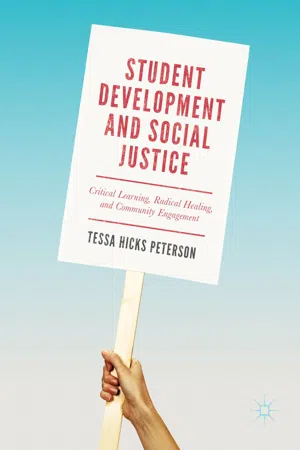“No Justice! No Peace!” This rallying cry has been a mainstay in movements for social change since the 1965 civil rights march in Selma, Alabama to the 2017 women’s march on Washington. As the message clearly indicates, without justice in the world, we cannot have peace —the two are intertwined. The message also suggests a threat of public disruption of peace in the streets unless the systems which have failed to recognize the plight of the oppressed are dismantled . It raises the power of the people to fight against the ideologies and structures that restrict the rights and access to opportunity of those they allege to serve. It mobilizes dissent as a democratic right and civic obligation to ensure that “liberty and justice for all” is not a slogan, but a lived virtue of the nation .
People mobilize around such concepts when they no longer find it tenable to live under the constraints of policies and social norms that denigrate their humanity , wellbeing, and political and economic opportunities (Palmer 2009) . Such fights for peace and justice are usually led by those directly affected by oppression , with the support of allies and accomplices who see themselves as intricately bound to the fate of their neighbors. When changemakers convey their rage , hope , and demands with a force that is politically unstoppable and socially uncontainable, seemingly immovable social contracts (such as slavery, Jim Crow, suffrage, marriage inequality) either internally combust or are deliberately dismantled . Laws and norms are not ceded without struggle; sometimes that struggle is armed though it is often achieved through peaceful resistance informed by non-violent communication, civil disobedience, and a relentless faith that we shall overcome.
I propose that direct means for resisting fatalism, hopelessness , or complacency in the face of injustice today will also include a shift to know peace and know justice. This may be a subtle distinction but it involves a sense of peace and justice that is both political and affective, critically minded and heart centered, involving direct action as well as mindful contemplation. The move to know peace involves being willing to take care of ourselves and each other as part of the struggle. Cultivating a sufficiently peaceful inner world enables us to respond more mindfully and effectively to the enraging injustices around us. Practicing a love ethic that encourages the wellbeing of our minds, bodies, and spirits and that of our communities and planet enables us to deeply know peace in these places. The move to know justice involves understanding the root conditions that have led to instances of injustice, the people affected by it (even those who may seem culturally , politically, or geographically different and distant from oneself), and ways to shift the policies and practices that perpetuate it. It also involves knowing and sitting with the discomfort that arises from this understanding and cultivating the relationships , tools , and hope necessary to mobilize against injustice. It entails critically engaging with community and collectively envisioning a just society . To know peace and justice is to know that, at a fundamental level, our liberations are bound together.
Knowing peace and justice, intimately and politically, seems more important today than ever before. Granted, rampant instances of injustice and xenophobia are emblematic of the lack of recognition, and at times blatant exploitation, of the intellectual and cultural experiences of marginalized peoples that have long been a part of our nation’s history. Such injustices are as common as the movements that arise to overturn them. Yet, strides made in recent decades in the realms of civil rights , social welfare, and economic equality are being destroyed at a rapidly increasing rate. In the United States, transnational connections are being challenged by ascendant ethno-nationalism and populist movements from the political right. The specific problems faced in the United States today are manifestations of global issues of disintegrating treaties, alliances, borders, social policies, and political processes. The polarization of our political parties is reflected in similar divisions and tensions among families and neighbors. Instead of building coalitions across differences to work to transform a system that benefits only the few to one that attends to the needs for justice and wellbeing of the many, we have seen an age-old trend re-emerge wherein those at the bottom are pitted against each other to fight for the crumbs.
Today’s political climate is suffused with anger , fear , suspicion, and hopelessness . A great many people are walking around with a mix of political heartbreak and spiritual disillusionment compounded by the lack of basic rights and protection for the most vulnerable among us. The political has become more personal than ever. Entire communities suffer politically as well as emotionally and physically from a society that does not tend to the fullness of their humanity . These traumas of injustice leave our communities both disconnected and disempowered. “Trauma has been defined as anything that overwhelms our capacity to cope and respond and leaves us feeling helpless, hopeless and out of control” (Levine 1997). This indeed applies to many who are affected by interlocking forms of domination and injustice. 1 The trauma of injustice has become a collective inheritance with structural, psychological , social, physical, and spiritual repercussions.
Instead of perpetuating the blame -game or seeking quick fixes to get us out of our current predicament, we might consider looking to change it through the reinvigoration of our core values : equality, equity, democracy , freedom, justice, and love . Yet, reclaiming Dr. King’s dream of the “ beloved community” cannot be wished into being. We must each create it intimately and consistently within our own families, communities, schools , and workplaces. The effect of targeted gr...
